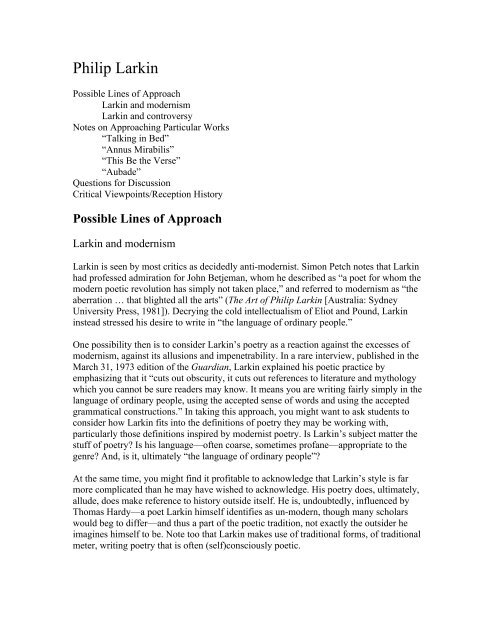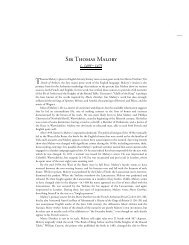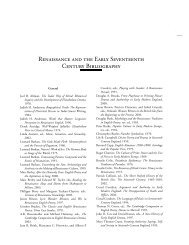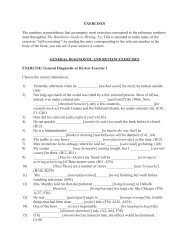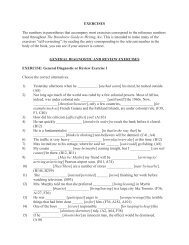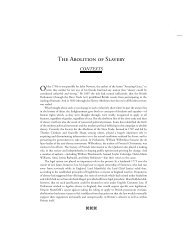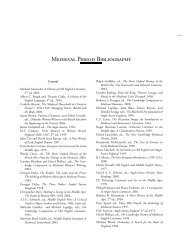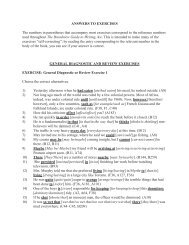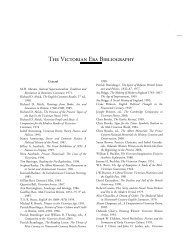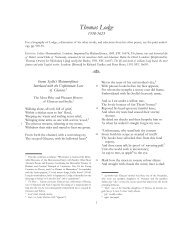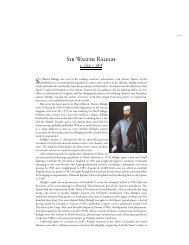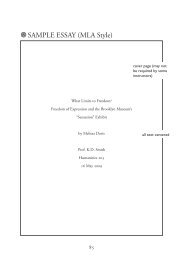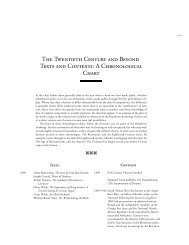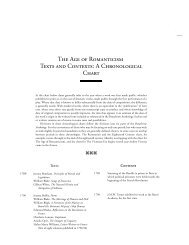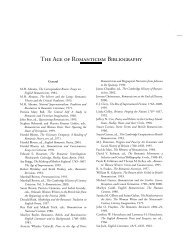Philip Larkin - Broadview Press Publisher's Blog
Philip Larkin - Broadview Press Publisher's Blog
Philip Larkin - Broadview Press Publisher's Blog
Create successful ePaper yourself
Turn your PDF publications into a flip-book with our unique Google optimized e-Paper software.
<strong>Philip</strong> <strong>Larkin</strong><br />
Possible Lines of Approach<br />
<strong>Larkin</strong> and modernism<br />
<strong>Larkin</strong> and controversy<br />
Notes on Approaching Particular Works<br />
“Talking in Bed”<br />
“Annus Mirabilis”<br />
“This Be the Verse”<br />
“Aubade”<br />
Questions for Discussion<br />
Critical Viewpoints/Reception History<br />
Possible Lines of Approach<br />
<strong>Larkin</strong> and modernism<br />
<strong>Larkin</strong> is seen by most critics as decidedly anti-modernist. Simon Petch notes that <strong>Larkin</strong><br />
had professed admiration for John Betjeman, whom he described as “a poet for whom the<br />
modern poetic revolution has simply not taken place,” and referred to modernism as “the<br />
aberration … that blighted all the arts” (The Art of <strong>Philip</strong> <strong>Larkin</strong> [Australia: Sydney<br />
University <strong>Press</strong>, 1981]). Decrying the cold intellectualism of Eliot and Pound, <strong>Larkin</strong><br />
instead stressed his desire to write in “the language of ordinary people.”<br />
One possibility then is to consider <strong>Larkin</strong>’s poetry as a reaction against the excesses of<br />
modernism, against its allusions and impenetrability. In a rare interview, published in the<br />
March 31, 1973 edition of the Guardian, <strong>Larkin</strong> explained his poetic practice by<br />
emphasizing that it “cuts out obscurity, it cuts out references to literature and mythology<br />
which you cannot be sure readers may know. It means you are writing fairly simply in the<br />
language of ordinary people, using the accepted sense of words and using the accepted<br />
grammatical constructions.” In taking this approach, you might want to ask students to<br />
consider how <strong>Larkin</strong> fits into the definitions of poetry they may be working with,<br />
particularly those definitions inspired by modernist poetry. Is <strong>Larkin</strong>’s subject matter the<br />
stuff of poetry? Is his language—often coarse, sometimes profane—appropriate to the<br />
genre? And, is it, ultimately “the language of ordinary people”?<br />
At the same time, you might find it profitable to acknowledge that <strong>Larkin</strong>’s style is far<br />
more complicated than he may have wished to acknowledge. His poetry does, ultimately,<br />
allude, does make reference to history outside itself. He is, undoubtedly, influenced by<br />
Thomas Hardy—a poet <strong>Larkin</strong> himself identifies as un-modern, though many scholars<br />
would beg to differ—and thus a part of the poetic tradition, not exactly the outsider he<br />
imagines himself to be. Note too that <strong>Larkin</strong> makes use of traditional forms, of traditional<br />
meter, writing poetry that is often (self)consciously poetic.
Ask students, too, to think through the implications of “ordinary language.” Can language<br />
ever really be ordinary? That is, do all “ordinary people” speak the same “ordinary”<br />
language?<br />
<strong>Larkin</strong> and controversy<br />
The posthumous publication of <strong>Larkin</strong>’s letters set off a minor storm of controversy, as<br />
the correspondence shed an unflattering, alarming light on <strong>Larkin</strong>’s personal beliefs,<br />
opinions, attitudes, and pleasures. The publication of Andrew Motion’s <strong>Philip</strong> <strong>Larkin</strong>: A<br />
Writer’s Life (Farrar, Straus & Giroux, 1993) only increased the attack. The poet and<br />
critic Tom Paulin labeled <strong>Larkin</strong>’s letters a “revolting compilation which imperfectly<br />
reveals and conceals the sewer under the national monument <strong>Larkin</strong> became.” Other<br />
writers—perhaps most notably Martin Amis, the son of Kingsley Amis, one of the<br />
recipients of <strong>Larkin</strong>’s letters—came to the poet’s defense, arguing that his personal<br />
prejudices, his racism and sexism, matter little in the final analysis of his work.<br />
The controversy presents an opportunity to discuss the intersection of poet and poetry.<br />
Ask students to consider how much or how little <strong>Larkin</strong>’s life matters in their assessment<br />
of his work. Does the knowledge of opinions he apparently held alter their perception of<br />
the poems? Is <strong>Larkin</strong>’s private life—which he seems to have successfully kept out of his<br />
published work—irrelevant? How important are the poet’s intentions to an analysis of the<br />
poetry? What do we wish to know of the poet’s biography before we can properly<br />
understand and appreciate his work?<br />
Notes on Approaching Particular Works<br />
“Talking in Bed”<br />
Form: Twelve-line poem, in four stanzas of three lines each.<br />
Background/Approaches: “Talking in Bed” offers a startling glimpse of intimacy, a<br />
frank, unadorned view of sex and relationships. While some of <strong>Larkin</strong>’s best-known<br />
(later) poetry celebrates the sexual revolution through the beginning of sexual intercourse<br />
(as in “Annus Mirabilis”), here we see the implications of sharing a bed, the (immediate)<br />
aftermath of sex.<br />
You may want to begin discussing the poem by first asking students to think through<br />
what they expect of poems about love and sex. What expectations might they form from<br />
the poem’s title? Are these expectations subverted by the poem that follows? What is the<br />
vision of human connection, of the bond between lovers, offered by “Talking in Bed”?<br />
Think too about the significance of a poem whose subject is the difficulty of speaking, of<br />
finding “words at once true and kind, / Or not untrue and not unkind.” Does the poem<br />
manage to find these words? Does this seem appropriate criteria to apply to poems about<br />
love generally? What might such words be? And why might they be so difficult to find?
Connections: It may be interesting to read “Talking in Bed” in conjunction with <strong>Larkin</strong>’s<br />
“Annus Mirabilis.” Though “Annus Mirabilis” is a later poem, “Talking in Bed” seems to<br />
depict the consequences of the year of wonders that inaugurated sexual intercourse.<br />
“Annus Mirabilis”<br />
Form: Twenty-line poem, in four stanzas of five lines each. Each stanza is rhymed<br />
abbab.<br />
Background/Approaches: The poem’s title is a Latin phrase meaning “wonderful year”<br />
or “year of miracles.” For <strong>Larkin</strong>, as he declares at the very start of his poem, 1963, or the<br />
year “sexual intercourse began,” is just such a wondrous year. You might want to begin<br />
at the beginning, asking students to consider the tone of the poem and the sincerity of the<br />
speaker. What do we make of a poem written in 1967 proclaiming that “life was never<br />
better than / In nineteen sixty-three”? How does the assertion that this was “just too late”<br />
for the speaker illuminate such a proclamation? And what can we make of a term<br />
traditionally used to refer to holy miracles serving as a title for a poem about sexual<br />
discovery?<br />
Connections: The Oxford English Dictionary notes John Dryden’s poem “Annus<br />
Mirabilis” (1667) as the first known recorded use of the phrase; Dryden’s poem<br />
commemorates the year 1666, a year that is perhaps most notable for the Great Plague of<br />
London, as well as the Great Fire. Dryden’s poem suggests that God’s wisdom and<br />
munificence have spared London from greater disaster (anticipated in a year ending with<br />
“666,” or the “Number of the Beast”), and that this constitutes a miracle. Dryden’s poem<br />
might serve as an interesting counterpoint to <strong>Larkin</strong>’s, particularly if we take into account<br />
<strong>Larkin</strong>’s comment, included in one of the letters he wrote as a student at Oxford, that he<br />
loathed Dryden.<br />
Because <strong>Larkin</strong> dates the beginning of sexual intercourse to “between the end of the<br />
Chatterley ban / And the Beatles' first LP,” you might consider asking students to read<br />
excerpts from D.H. Lawrence’s novel (Chapter 3 of the novel is included in “Contexts:<br />
Power, Politics, and the Book”), as well as to listen to songs from that Beatles’ first<br />
album, Please Please Me.<br />
The sexual revolution, or the “beginning of intercourse,” also figures prominently in<br />
<strong>Larkin</strong>’s “High Windows,” which alludes to the “paradise” represented by the realization<br />
that “he’s fucking here and she’s / Taking pills or wearing a diaphragm.”<br />
"This Be the Verse"<br />
Form: Twelve-line poem, in three stanzas of four lines each, rhymed abab.<br />
Background/Approaches: "This Be the Verse" first appeared in the August 1971 issue<br />
of the New Humanist and was then included in <strong>Larkin</strong>'s last published volume of poetry,
High Windows (1974). It is, perhaps, <strong>Larkin</strong>'s best-known poem; it is quite possibly his<br />
most quotable.<br />
You might want to begin by asking students to consider the poem's title. "This Be the<br />
Verse" appears to be evoking Biblical truths; some have suggested that it is reminiscent<br />
of God's promise to visit "the iniquity of the fathers upon the children" in Exodus. What<br />
is to be made of this mixture of the sacred and the profane? What does the combination<br />
of title and subject suggest about the poet’s view of religion? Of the family unit? Of the<br />
respect to be accorded to the father and the Father?<br />
Indeed, you may wish to focus the discussion on the family and the society for which the<br />
family arguably serves as the most basic unit. Consider the poem’s vision of social<br />
intercourse, of the relations between men, of inheritance and history. The vision is<br />
particularly jarring when regarded in light of the suggestion that no responsibility is<br />
borne and, thus, no resolution—save the refusal to reproduce, to continue the family<br />
line—is possible. You mum and dad may not mean to fuck you up, but they do so surely<br />
and without fail, a vicious cycle that ensures that your own children will suffer the same<br />
fate, perhaps a worse one. Do not, then, under any circumstances, have kids, <strong>Larkin</strong><br />
advises. But what is to be made of this “solution”? Is the advice offered sincerely? In<br />
jest? Is it so simple to dismiss the poem as a joke, or does it somehow defy such easy<br />
categorization?<br />
It may be helpful here to take the time of the poem’s publication into account. Written<br />
sometime in 1971, “This Be the Verse” appears to be acknowledging and coming to<br />
terms with the effects of the countercultural movements of the Sixties, to be suggesting<br />
that the generational gap, between those now coming of age and those who matured at an<br />
earlier time, is not easily overcome. Precisely where <strong>Larkin</strong> falls in with the generations<br />
is not clear: on the one hand, the poem seems to announce its allegiance and indebtedness<br />
to the Free Speech Movement, to side with the young in its use of the word “fuck” in its<br />
very first line; on the other hand, the poem makes use of traditional form and meter.<br />
Perhaps, then, “This Be the Verse” is a child of sorts—note the sing-song, nursery rhyme<br />
scheme of the poem—bred by tradition and liberation, and “fucked up” by both in turn.<br />
Connections: Among <strong>Larkin</strong>’s own work, several of the poems included in the same<br />
collection as “This Be the Verse”—1974’s High Windows—might be of interest in<br />
studying the poem. The collection’s title poem also makes use of profanity, in part to<br />
stress the division between the generations; arguably, “Annus Mirabilis,” though less<br />
shocking in its language, makes a similar case. You may also want to look at “Vers de<br />
Sociéte,” which presents a bleak vision of social life, a vision possibly informed by the<br />
kind of family history depicted in “This Be the Verse.”<br />
You might also want to direct students’ attention to Robert Louis Stevenson’s<br />
“Requiem,” which likely supplied <strong>Larkin</strong>’s title: “This be the verse you grave for me /<br />
Here he lies where he longed to be.” The allusion to Stevenson is particularly interesting,<br />
for in “Requiem,” the speaker finds happiness and peace in death seen as homecoming.
“Aubade”<br />
Form: Fifty-line poem, in five stanzas of ten lines each. Each stanza is rhymed<br />
ababccdeed.<br />
Background/Approaches: “Aubade” was published in the Times Literary Supplement<br />
on December 23, 1977. Though <strong>Larkin</strong> would go on to write and publish several more<br />
poems, “Aubade” is arguably his last important poem.<br />
The American Heritage Dictionary defines “aubade” as “a song or instrumental<br />
composition concerning, accompanying, or evoking daybreak,” or “a poem or song of or<br />
about lovers separating at dawn.” Traditional aubades often take the form of a dramatic<br />
dialogue between lovers, with one announcing the coming of dawn, which heralds<br />
parting, and the other refusing to take heed. Ask students to consider how Auden's<br />
aubade functions within this tradition; who is the “lover” addressed by the poem's<br />
speaker? Many critics have pronounced the “lover” to be life itself, seeing the poem as<br />
fundamentally about death. How satisfying is this explanation? What might it suggest<br />
about the tone of the poem? Its mood?<br />
Another possibility may be suggested by the fact that “Aubade” was written toward the<br />
end of <strong>Larkin</strong>’s career. Ask students to think about the ways in which the poem seems to<br />
be offering a summation, a culmination of the themes that have concerned the poet, that<br />
reoccur throughout his body of work. In what sense can “Aubade” be said to represent a<br />
leave-taking of sorts, a goodbye the poet offers to the poetry?<br />
In a similar vein, how does “Aubade” invoke, reiterate, and expand on the themes<br />
common to <strong>Larkin</strong>’s work? How does it represent his concern with the everyday, with<br />
ordinary life? How is that life understood now that it is ending? How is “Aubade” more<br />
“poetic” than <strong>Larkin</strong>’s earlier poems?<br />
Connections: John Donne found the aubade particularly well-suited to metaphysical<br />
rumination and his “The Sun Rising” is a good example of the form.<br />
Questions for Discussion<br />
1. Discuss <strong>Larkin</strong> in relation to modernism. Is his avowal of an anti-modernist stance<br />
evident in the poetry?<br />
2. How does <strong>Larkin</strong> reconcile form and subject? That is, what can be made of his<br />
frank discussions and occasionally obscene language in connection to his use of<br />
traditional poetic form and meter?<br />
3. How does <strong>Larkin</strong>’s use of rhyme contribute to the effect of his poetry? How does<br />
rhyme contribute, for example, to the impact of “This Be the Verse”?
4. Discuss <strong>Larkin</strong>’s use of language. Does he use “the language of ordinary people …<br />
the accepted sense of words and … the accepted grammatical constructions”? How<br />
does <strong>Larkin</strong>’s attempt to use such language impact the poetry?<br />
5. What is <strong>Larkin</strong>’s vision of the family? Of society? Of history?<br />
6. In a review of <strong>Larkin</strong>’s Collected Poems, Derek Walcott says that <strong>Larkin</strong> “invented<br />
a muse: her name was Mediocrity.” Other critics, too, have seen him as the poet of<br />
the everyday. How apt is the description of <strong>Larkin</strong> as the diurnal poet, one<br />
chronicling the average life? And what, ultimately, is <strong>Larkin</strong>’s sense of existence?<br />
7. How does the controversy following the publication of <strong>Larkin</strong>’s correspondence<br />
affect your perception of the poetry?<br />
Critical Viewpoints /Reception History<br />
In January 2008, the Times of London named <strong>Philip</strong> <strong>Larkin</strong> the greatest postwar British<br />
writer. Conceding that “he was, it is now generally agreed, not a very nice man” and that<br />
his Collected Poems is a rather slender tome, the Times writer, Erica Wagner, pronounced<br />
<strong>Larkin</strong> “the quiet modern genius of English letters.”<br />
As the Times article suggests, <strong>Larkin</strong> was not, by any stretch of the imagination, a prolific<br />
poet; he published five relatively short volumes of poetry, with long intervals between<br />
each. Of those, he considered only the last three—The Less Deceived (1955), The<br />
Whitsun Weddings (1964), and High Windows (1974)—mature, significant work. [<strong>Larkin</strong><br />
also authored two novels—Jill and A Girl in Winter, as well as a number of essays and<br />
reviews.] Nonetheless, he is widely considered an important voice, a major English poet,<br />
perhaps, as the British critic Clive James would have it, “the greatest poet of his time.”<br />
He was also a man who, as revealed by the publication of his correspondences, was prone<br />
to racism, misogyny, and an interest in sadomasochistic pornography.<br />
Still, at the time of his death, <strong>Larkin</strong> was certainly the best-known and most admired poet<br />
of his generation, as is readily evident from the obituaries marking his death at the age of<br />
63. A year earlier, in 1984, <strong>Larkin</strong> had declined the poet laureate post offered to him; he<br />
had promised to do as much when, once asked what he thought about the prospect, he<br />
claimed, “I dream about that sometimes—and wake up screaming. With any luck they'll<br />
pass me over.” That he was not passed over is a testament to <strong>Larkin</strong>’s poetic powers; that<br />
he passed on the offer is a testament to his own reclusive tendencies, his preference for<br />
solitude and privacy, and, perhaps most significantly, to his own poetic inclinations.<br />
Reviewing <strong>Larkin</strong>’s Collected Poems (1989) in The New York Review of Books, Derek<br />
Walcott writes, “The average face, the average voice, the average life—that is, the life<br />
most of us lead, apart from film stars and dictators—had never been defined so precisely<br />
in English poetry until <strong>Philip</strong> <strong>Larkin</strong>. He invented a muse: her name was Mediocrity. She<br />
was the muse of the diurnal, of habit, of repetition. She lived in life itself, not as a figure<br />
beyond it, a phantom of yearning, but as the plain, transparent companion of a confirmed
enedict.” In another review of the collection, J.D. McClatchy suggests that <strong>Larkin</strong><br />
“refused both the glamorous technical innovations and myth-mongering of Modernism as<br />
well as the will to transcendence that empowered many of his peers. He preferred to<br />
write, in clipped, lucid stanzas, about the failures and remorse of age, about stunted lives<br />
and spoiled desires…. But from such refusals he fashioned a rich body of work likely to<br />
stand as the most enduring of mid-century British poetry.” It is precisely this lucidity that<br />
many reviewers recognized as the key to <strong>Larkin</strong>’s greatness even before his death; in a<br />
1984 review of <strong>Larkin</strong>’s miscellany, Anatole Broyard wrote, “It would be difficult to<br />
imagine a more unpretentious poet than <strong>Philip</strong> <strong>Larkin</strong>. In fact, his poems almost seem to<br />
consist of what is left after all pretentiousness is edited away. He restores the English<br />
language to a dictionary freshness, until it crackles like new money.”<br />
Such freshness seems to have been the result of <strong>Larkin</strong>’s unequivocal anti-modernist<br />
stance, Simon Petch posits in The Art of <strong>Philip</strong> <strong>Larkin</strong> (1981). That stance would have<br />
much to do with <strong>Larkin</strong>’s critical reception and its fluctuating fortunes. Following his<br />
inclusion in Poets of the 1950s, edited by D.J. Enright, <strong>Larkin</strong> came to be seen as<br />
representative of a particular moment (the 1950s) in a particular tradition (English<br />
poetry); “it is in the poetry of <strong>Philip</strong> <strong>Larkin</strong> that the spirit of the 1950s finds its most<br />
complete expression in English poetry,” A.R. Jones wrote in “The Poetry of <strong>Philip</strong><br />
<strong>Larkin</strong>: A Note on Transatlantic Culture” (Western Humanities Review, 1962). Other<br />
critics would echo the assessment, locating in <strong>Larkin</strong>’s poetry “the inherent tragedy of the<br />
human condition” as it comes to a head in “the mid-twentieth century” (Lolette Kuby, An<br />
Uncommon Poet for the Common Man [The Hague: Mouton, 1974]). Others stressed his<br />
English “gentility” (A. Alvarez, The New Poetry [Penguin, 1962]). Such appraisals could<br />
be a double-edged sword, particularly as critics increasingly came to view <strong>Larkin</strong> as<br />
being in direct opposition to what was seen as adventurous developments in American<br />
poetry in the 1960s. By the time <strong>Larkin</strong>’s last volume of poetry, 1974’s High Windows,<br />
was published, many critics decreed it a falling-off from his previous work, though the<br />
collection included poems that would come to be some of <strong>Larkin</strong>’s best-known and mostloved<br />
work, including “This Be the Verse” and “Annus Mirabilis.” On the other hand, the<br />
publication of <strong>Larkin</strong>’s criticism, reviews, and essays as Required Writing: Miscellaneous<br />
Pieces 1955-1982 (1983) seemed to restore critical accolades, bringing in fresh praise<br />
and a renewed appreciation, not only for the prose pieces but for the poetry as well.<br />
In the meantime, <strong>Larkin</strong> himself stayed out of the fray. He continued his work as a<br />
university librarian, rarely granting interviews or doing any sort of publicity. (In a rare<br />
interview with the Paris Review, <strong>Larkin</strong> remarked of those poets who explain their work,<br />
“It’s like going round explaining how you sleep with your wife.”)<br />
Though <strong>Larkin</strong>’s reputation seemed secured at the time of his death, the 1992 publication<br />
of his letters (which he had apparently wished destroyed upon his death) as well as a<br />
biography by Andrew Motion (<strong>Philip</strong> <strong>Larkin</strong>: A Writer’s Life, 1993) raised new questions<br />
about the poet’s views. <strong>Larkin</strong>’s correspondence revealed troubling tendencies toward<br />
racism and sexism, an apparent obsession with pornography, and a turn to right-wing<br />
politics (particularly disturbing in conjunction with the revelation that <strong>Larkin</strong>’s father had<br />
been an admirer of Hitler). But ultimately, as Clive James has noted, <strong>Larkin</strong> managed to
keep his darker impulses out of his poetry. That poetry ultimately stands alone: proud,<br />
beautiful, significant, lasting.<br />
The publisher gratefully acknowledges the assistance of Yevgeniya Traps of Queens<br />
College, The City University of New York, for the preparation of the draft material.


